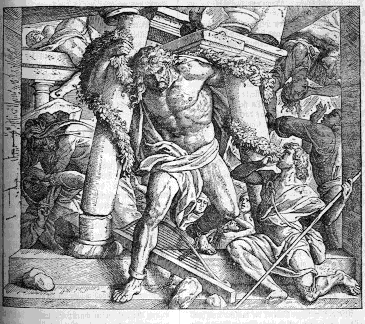"All these indignities for such they are
From thine the evils I deserve and more,
Acknowledge them from God inflicted on me
Justly, yet despair not of his final pardon,
Whose ear is ever open, and his eye
Gracious to re-admit the suppliant:"
Samson rebukes his taunter, Harapha of Gath in John Milton's, "Samson Agonistes".
My wife knew where the resting place of John Milton is located in London and a week ago Friday she took me to the spot. I am a fanatical fan of John Milton. St Giles without Cripplegate is a small church located along the original wall of London and just steps from what is now the financial district. It is called "without Cripplegate" because it was outside the wall. The term Cripplegate is an old Anglo-Saxon word, "Cruplegate" meaning a covered way or tunnel.

The church is one of the only few remaining medieval churches in London proper founded in 1090 A.D. The families of Thomas More and William Shakespeare worshiped at St. Giles. John Bunyan, the author of "Pilgrim's Progress"was christened and attended the church. Oliver Cromwell, Lord Protector of England, Scotland and Ireland was married in the church.
While visiting the church, one of the ladies organizations associated with St. Giles was holding a book sale. Danae found a Milton book I was unfamiliar with, "Samson Agonistes". It is not known for sure when Milton wrote the poem, but it was released at the same time as Paradise Regained late in his life. Milton wrote many of his greatest works after he lost his sight.
Milton takes on the story of Samson after his fall from grace. Now imprisoned by the Philistines, Samson is visited by his father, Delilah, Harapha the Giant of Philistine, a public officer and messenger, with the narrative of the Chorus. As is Milton's gift, he takes a well know story and improves the story telling and peppers it with his political notions. He brings to life the story of Samson his confessions and the carnage at the Baal festival that follows.
Immediately, Milton warns us about the use of our God given gifts without guidance, this from the mouth of Samson:
"But what is strength without a double share
Of Wisdom? Vast, unwieldy, burdensome,
Proudly secure, yet liable to fail"
Then followed by a warning about our associations:
"Young coming friends, revives me; for I learn
Now of my own experiences not talk.
How counterfeit a coin they are who' friends'
Bear in their superscription (of the most
I would be understood). In prosperous days
They swarm but in adverse withdraw their head,
Not to be found, thought sought."
Milton then takes the history of Israel and sends us a message about the politics in his day. As a Puritan Parliamentary supporter, an incredible story in itself, he gives us a warning about our governments:
"But what more oft, in nations grown corrupt,
And by their vices brought to servitude,
Thou to love bondage more than liberty -
Bond with ease than strenuous liberty -
And to despise, or envy, or suspect,
Whom God hath of his special favor raised
As their deliverer?"
First a warning of abusing God's gifts, the dangers of wrong associations, of succumbing to those not ordained to be our leaders, and then a word to those who deny God's existence:
"Unless there be who think not God at all.
If any be, they walk obscure ;
For of such doctrine never was there school,
But the heart of a fool,
And no man therein doctor but himself"
Throughout the poem Samson's father, Manoa is a voice of truth, the Gospel and of Biblical prophecies.
"(Nothing more certain) will long defer
To vindicate the glory of his name
Against all competition, nor will long
Endure it doubtful whether God be Lord
Or Dragan."
"Be penitent, and for they fault contrite;
But act not in thy own affliction son.
Repent the sin; but, if the punishment
Thou canst avoid, self-preservation bids;"
Hopefully you've heard the story of Samson in the Book of Judges. If not, this story comes to life on the page with Miltonion phrase and is worth the short investment of your time.
"All is best, though we oft doubt
What the unsearchable dispose
Of Highest Wisdom brings about,
And ever best found in the close.
Oft He seems to hide his face,
But unexpectedly returns,
And to his faithful champion hath in place
Bore witness gloriously; when Gaza mourns,
An all that band them to resist
His uncontrollable intent.
His servants, He, with new acquist
Of true experience from this great event,
With peace and consolation hath dismissed,
And calm of mind, all passions spent."